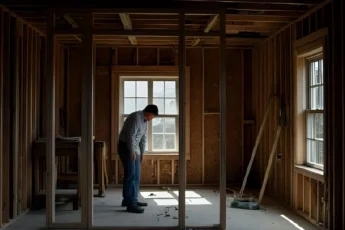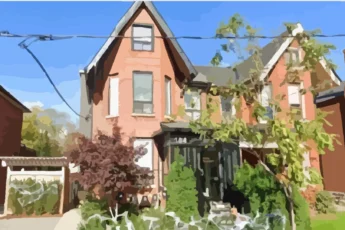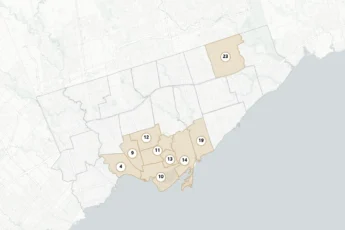In recent years, renovation scams in Toronto have become an unfortunate, yet growing, issue in the city. From deceptive contractors who vanish with deposits to unscrupulous individuals trying to manipulate homeowners into buying unnecessary services, it’s essential for property owners to be vigilant when hiring a contractor for any type of home renovation.
To help guide you through the maze of potential pitfalls, we’ve gathered insights into common scams, warning signs to watch out for, and tips for finding a trustworthy contractor.
Common Renovation Scams in Toronto
The Water Test Scam
This is a classic scam that’s caught many homeowners off guard. A contractor or water “specialist” arrives at your home claiming to test the quality of your water. They pour your tap water into a lab funnel, shake it, and show you the minerals that settle at the bottom. The trick here is that the minerals you see are actually common in Toronto’s tap water. They are natural and are part of the reason your water is clean and drinkable.
However, the scammer will claim that your water is “full of garbage” and suggest that you need to buy an expensive water filtration system. The reality is, Toronto’s water quality is closely regulated and safe to drink, but these scammers aim to take advantage of your concern with a costly, unnecessary purchase.
Tip: Always be skeptical of unsolicited water tests. If you have any concerns about your water quality, it’s best to consult your local water provider or hire a certified professional.
Driveway Paving Con
Some contractors may offer you a “special deal” on driveway paving by claiming they are working in the neighborhood and can give you a discount because they are already in the area. Once they receive your payment, they either don’t show up to complete the job or perform subpar work, such as a poorly done paint job instead of actual paving.
The scam typically involves collecting your money up front for a service they never deliver. It’s a cheap trick that leaves homeowners frustrated and out of pocket.
Tip: Always be cautious of unsolicited offers and get written agreements for any work that’s being done. A reputable contractor will never offer work without a clear, agreed-upon scope of work and payment plan.
The Roof Repair Trick
Roofing scams are another widespread issue. In this scenario, a contractor offers to repair your roof at a seemingly low price. They begin the job but soon claim that additional, unforeseen issues have been discovered, and more money is required to complete the work. Feeling trapped with a half-done roof, many homeowners are pressured into paying the inflated price.
This tactic is a common way for scammers to get more money than initially agreed upon. Once you pay the extra amount, the contractor often disappears, leaving your roof incomplete and vulnerable to the elements.
Tip: Always get multiple quotes before agreeing to any roofing work. A legitimate contractor will inspect the roof thoroughly before providing a final, fixed price, and they should never ask for more money mid-project unless there’s a true, unexpected complication.
The Deposit Scam
Some contractors may ask for an upfront deposit and, once paid, disappear without performing any work. This is an especially dangerous scam because it relies on trust—and once the money is gone, there’s often no way to recover it.
Tip: Always insist on a receipt for any deposit paid, and ensure there’s a clear agreement specifying how the deposit will be used.
How to Vet a Contractor: Your Guide to Finding a Trusted Professional and Avoiding Renovation Scams in Toronto
Hiring a contractor is a major decision, and it’s important to ensure that you’re working with a legitimate and reliable professional. Here’s how to protect yourself and make sure your contractor is the real deal:
Download Our Contractor Vetting Checklist
Request a Detailed Written Quote
A reputable contractor will always provide a comprehensive written quote. The quote should outline:
- A detailed scope of work.
- A list of materials to be used.
- A breakdown of costs.
- An estimated project timeline with clear milestones.
Avoid contractors who provide vague or general estimates. A well-prepared written quote not only sets clear expectations but also protects you from price hikes or misunderstandings during the project.
Use Traceable Payment Methods
Always pay using traceable methods like bank transfers, checks, or credit cards. Paying in cash leaves no record and gives you no recourse if something goes wrong. When paying, always ask for a receipt, especially for deposits.
Tip: Most reputable contractors require a deposit, but it should never exceed 10-15% of the total project cost. If a contractor demands a larger deposit, they should provide a reasonable explanation for the additional amount.
You Might Also Like: Toronto’s Renoviction Crackdown
Check Their Credentials
Contractors need licenses and certifications for certain work, including electrical, plumbing, and HVAC. Always ask for proof and verify with the relevant authorities.
Additionally, make sure the contractor has a valid HST (Harmonized Sales Tax) number, which is a key indicator of a legitimate business.
- To check a Harmonized Sales Tax (HST): Canada Revenue Agency – GST/HST Registry
Ask About Insurance
Insurance is a must for any professional contractor. Ensure they carry both liability insurance to cover potential damage to your property and workers’ compensation insurance in case of accidents on the job.
Tip: Make sure the insurance covers the specific type of work they’ll be doing. Sometimes, contractors have insurance but it doesn’t cover the actual contracting work, leaving you unprotected. Always ask for a copy of their insurance certificate and verify it directly with the insurer.
Request References and Portfolio
A reliable contractor will provide references from past clients and examples of previous work. Follow up with their references to get honest feedback on the contractor’s performance, quality of work, and adherence to timelines.
If possible, visit completed projects in person to assess the quality of the work. Beware of contractors who avoid providing references or whose portfolios seem sparse or unverified.
Assess Professionalism and Vehicle
When meeting a contractor, consider how they present themselves and their vehicle. While it’s normal for a professional to use a work vehicle to transport tools and materials, if a contractor arrives in a flashy luxury car with no visible tools or equipment, that’s a red flag.
Exception: If the contractor is meeting you for a consultation or quote and is using their personal car for the meeting, that’s fine. However, if they arrive for the actual work in a luxury vehicle, it’s worth asking questions.
Establish Milestones and Timelines
A professional contractor will provide you with a detailed project timeline and clear milestones. This includes the dates for major stages of the renovation, inspections, and approvals. If unexpected issues arise, such as structural problems or mold, the contractor should discuss the potential costs and timeline extensions upfront.
It’s important that you know exactly what to expect at each stage of the project, and that they keep you updated regularly.
Final Tip: When Something Sounds Too Good to Be True… It Probably Is
Renovation scams in Toronto often hinge on tempting offers that seem too good to pass up. If a deal sounds too good to be true, it likely is. Always do your due diligence, and trust your instincts.
By following these tips and keeping a close eye on potential red flags, you’ll be in a much better position to find a trustworthy contractor and avoid falling victim to a renovation scam.



